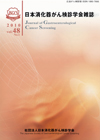Volume 48, Issue 5
Displaying 1-27 of 27 articles from this issue
- |<
- <
- 1
- >
- >|
Review article
-
2010 Volume 48 Issue 5 Pages 511-521
Published: 2010
Released on J-STAGE: October 15, 2010
Download PDF (1661K)
Original article
-
2010 Volume 48 Issue 5 Pages 522-528
Published: 2010
Released on J-STAGE: October 15, 2010
Download PDF (1473K)
Case study
-
2010 Volume 48 Issue 5 Pages 529-535
Published: 2010
Released on J-STAGE: October 15, 2010
Download PDF (3093K)
-
2010 Volume 48 Issue 5 Pages S49-S89
Published: 2010
Released on J-STAGE: January 27, 2016
Download PDF (2483K)
-
2010 Volume 48 Issue 5 Pages S92
Published: 2010
Released on J-STAGE: January 27, 2016
Download PDF (1589K)
-
2010 Volume 48 Issue 5 Pages S93
Published: 2010
Released on J-STAGE: January 27, 2016
Download PDF (1475K)
-
2010 Volume 48 Issue 5 Pages S94
Published: 2010
Released on J-STAGE: January 27, 2016
Download PDF (1472K)
-
2010 Volume 48 Issue 5 Pages S95-S100
Published: 2010
Released on J-STAGE: January 27, 2016
Download PDF (1499K)
-
2010 Volume 48 Issue 5 Pages S101-S104
Published: 2010
Released on J-STAGE: January 27, 2016
Download PDF (1604K)
-
2010 Volume 48 Issue 5 Pages S105-S109
Published: 2010
Released on J-STAGE: January 27, 2016
Download PDF (1730K)
-
2010 Volume 48 Issue 5 Pages S110-S113
Published: 2010
Released on J-STAGE: January 27, 2016
Download PDF (1484K)
-
2010 Volume 48 Issue 5 Pages S115-S116
Published: 2010
Released on J-STAGE: January 27, 2016
Download PDF (1657K)
-
2010 Volume 48 Issue 5 Pages S117-S120
Published: 2010
Released on J-STAGE: January 27, 2016
Download PDF (2061K)
-
2010 Volume 48 Issue 5 Pages S121-S124
Published: 2010
Released on J-STAGE: January 27, 2016
Download PDF (1802K)
-
2010 Volume 48 Issue 5 Pages S125-S129
Published: 2010
Released on J-STAGE: January 27, 2016
Download PDF (2059K)
-
2010 Volume 48 Issue 5 Pages S131-S135
Published: 2010
Released on J-STAGE: January 27, 2016
Download PDF (2051K)
-
2010 Volume 48 Issue 5 Pages S137-S140
Published: 2010
Released on J-STAGE: January 27, 2016
Download PDF (1799K)
-
2010 Volume 48 Issue 5 Pages S141-S144
Published: 2010
Released on J-STAGE: January 27, 2016
Download PDF (1679K)
-
2010 Volume 48 Issue 5 Pages S145-S147
Published: 2010
Released on J-STAGE: January 27, 2016
Download PDF (1911K)
-
2010 Volume 48 Issue 5 Pages S149-S153
Published: 2010
Released on J-STAGE: January 27, 2016
Download PDF (1940K)
-
2010 Volume 48 Issue 5 Pages S155-S159
Published: 2010
Released on J-STAGE: January 27, 2016
Download PDF (1804K)
-
2010 Volume 48 Issue 5 Pages S161-S164
Published: 2010
Released on J-STAGE: January 27, 2016
Download PDF (1794K)
-
2010 Volume 48 Issue 5 Pages S165-S168
Published: 2010
Released on J-STAGE: January 27, 2016
Download PDF (1929K)
-
2010 Volume 48 Issue 5 Pages S169-S172
Published: 2010
Released on J-STAGE: January 27, 2016
Download PDF (2009K)
-
2010 Volume 48 Issue 5 Pages S173-S178
Published: 2010
Released on J-STAGE: January 27, 2016
Download PDF (2076K)
-
2010 Volume 48 Issue 5 Pages S179-S186
Published: 2010
Released on J-STAGE: January 27, 2016
Download PDF (2076K)
-
2010 Volume 48 Issue 5 Pages S187-S197
Published: 2010
Released on J-STAGE: January 27, 2016
Download PDF (2606K)
- |<
- <
- 1
- >
- >|
